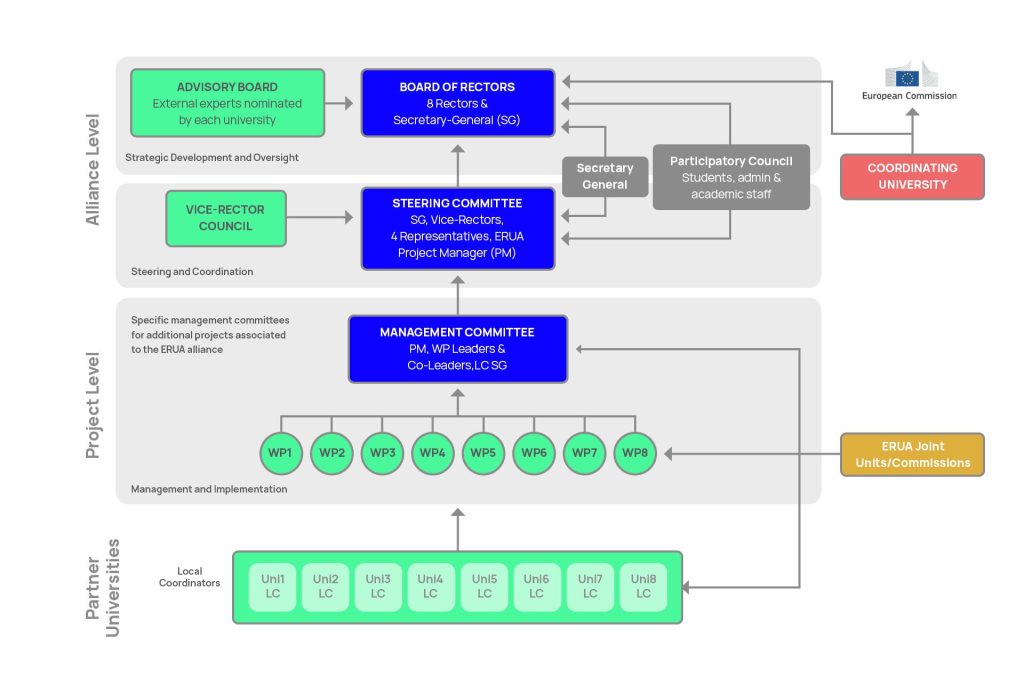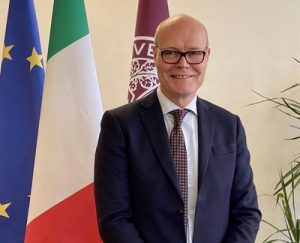
Governance
The new ERUA governance aims at improving the management capacity and strategic focus of the alliance, and strengthening its institutional anchoring in the member universities.
The governance bodies are led by renown figures and are supported by shared efficient management structures and services and effective communication based in agile methodologies.

ERUA governance structure spreads along three levels:
- strategic development and oversight,
- steering and coordination,
- management and implementation.
The structure consists of several ERUA governance bodies supported by ERUA joint units/commissions and ERUA Local Coordinators at the level of each partner university:
The Board of Rectors (BoR) formulates the strategy of the alliance and approves major strategic decisions and policies impacting the Alliance. It is composed by the Rector of each of the member Universities of ERUA and the Secretary General of the Alliance.
The Steering Committee is responsible for ensuring overall effective steering of activities and, together with the Vice-Rector Councils, for fostering alignment between ERUA and the member universities strategies. The members of the Steering Committee are in charge of supervising the whole ERUA setting-up process and of taking strategic decisions with the contribution of the Management Committee. As one of the strategic steering and decision-making bodies of the alliance, the Steering Committee’s role is to guide the alliance’s internal and external strategy and to formulate recommendations on key issues and projects for consideration by the Alliance’s Board of Rectors. It reviews the general progress of the projects and takes relevant decisions regarding major strategic matters that require decision at a lower level than the Board of Rectors.
The Management Committee is the primary project implementation body of the ERUA, which is responsible for ensuring operational and day-to-day activity coordination, achieving the alliance objectives and delivery of outcomes and fostering effective engagement of the partner universities.
The Student Board forms an integral part of the consortium, functioning as a Consortium Body. The Student Board (SB) is the highest student representing body of the Consortium. It mainly contributes to the activities of the Steering Committee and the Participatory Council. It plays a vital role in representing student interests and perspectives. It acts as the official voice of the student body, advocating for their concerns in decision-making processes. The board facilitates communication between the alliance and students, organizing events to foster a sense of community. It collaborates with university administrators, influencing policies that impact students and ensuring diversity and inclusion. The board promotes international collaboration, advocates for quality education, and supports initiatives for student services and professional development. Additionally, it serves as a feedback mechanism, maintaining transparency and accountability to the diverse student population across the alliance.
The Alliance’s strategic advisory role is supported by thematic Vice-Rectors Councils, which will be set up as soon as the Steering Committee is officially established. These Vice-Rectors Councils will be the antechambers of the Steering Committee. The Vice-Rectors Councils for International Affairs, for Academic Affairs, for Research, for IT and Digitalisation and for Communication have already been identified as needed. Other Vice-Rectors Councils may be set up as required. Each Vice-Rectors Council will be led by the member university which has major responsibility for the WP to which its theme relates. This will ensure consistency of leadership and agendas between the WPs and the Vice-Rectors Councils.
The external Advisory Board (AB) is composed by external members nominated by the Board of Rectors and provides advice on long-term strategy, governance, education and research activities, as well as implementation of the Description of action.
The Work package boards (WP Board) are working groups composed of WP leaders, project officers and experts in each area of the WPs. At least one academic and/or administrative staff will represent each university and participate in the WP. Each WP Board is coordinated by representatives of the university which is responsible for the deliverables of the corresponding WP. They meet virtually on a regular basis (at least every 3-4 weeks) as well as physically once a year. They are in charge of the implementation of the Work Plan in their respective areas and may set up further task forces if deemed necessary.
The Local Coordination (LC) teams guarantee a broad participation at the local level for each partner, including academics and students. They are in charge of the internal organization and coordination of ERUA activities and ensure data collection within their universities for further feedback.



The faces of ERUA
The Board of Rectors


Roman Cieślak
Rector
SWPS University
Chairman of ERUA Board of Rectors


Paris 8 University


Plamen Doynov
Rector
New Bulgarian University


Dimitrios Papageorgiou
Rector
University of the Aegean


Eduard Mühle
President
European University Viadrina


John Mc Court
Rector
University of Macerata


Lluís Serra Majem
Rector
University of Las Palmas de Gran Canaria


Inga Žalėnienė
Rector
Mykolas Romeris University

